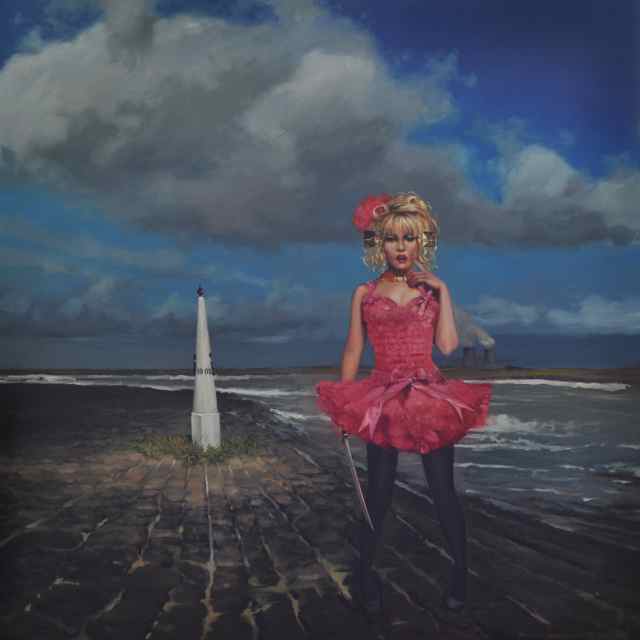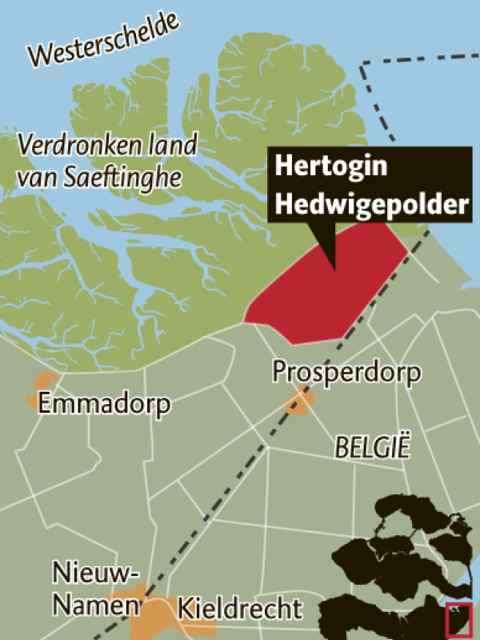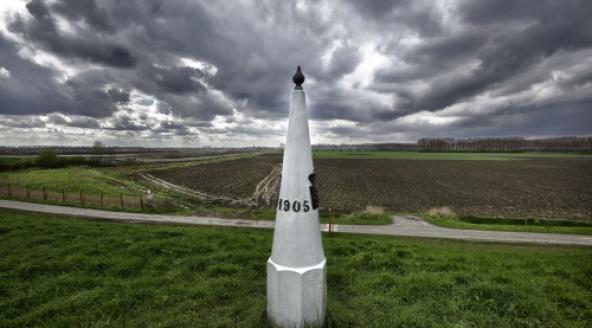You can’t eat money
Hedwige is the name of Duchess Hedwige de Linge (1877-1938). Her name was given to a piece of land Dutch farmers captured from the sea. It was a last victory in a long range of hard labor and batteling waters around this part of Holland. The Hedwige polder, was created in 1905 by the Department of Public Works. That’s a efficient agency in the Netherlands that is continualy creating polders and dikes. The Hedwige polder is situating next to a wetland named ’the drowned land of Saeftinge’. That’s a very old wild piece of land, full of memories and losses. It was taken bij the sea a long time ago.
But in the year 1905 we take a part of it back to start farming again. Now, a 100 years later, the Dutch politicians Ed Nijpels and Carla Peijs (Dutch Liberal party VVD) decide to flood the Hedwige polder to compensate nature for a huge building project in the port of Antwerpen. Dispite history and many years of hard labor in the past and against all Dutch principles of winning land from the surrounding waters.
Farmers of the Hedwige polder were not amused when they were confronted with these plans and start a protest to protect their land, properties and personal history. They feel betrayed by their own government and most of them became protesters.
I decide to paint them in the person of a sweet young woman, called Hedwige. She’s got nothing to loose and went to extreme thoughts (reed more on Zeeuws meisje doet raar) to stay on her own property and to protect it. She also stands for people in Groningen. They face the same problems with the gas-mining company NAM (Dutch Oil Company). Earthquakes, caused by gas drilling, ruin their houses and land. Economic profits seems more important to lawmakers ans politicians. That will make people radical and furius.
Omroep Zeeland (Sealand tv) spend a documentary to this situation and give you an explanation and crucial background information. Just click on the subtitle button to get Englisch subtitles. In this video you will find out that there is also an other story to tell on this issue. The economic story where thousants of people are depend on. That will make it almost impossible to bring up a fair dicision.
It’s a long story but I dicide to focus on the people in the field. Their tragedy and their struggle for survive is an emotional, personal battle against everything and everyone. They on their own now. Not in a hopeless fight against water but in battle with growing industry, growing popultion and growing economic benefits. They are farmers. They produce food, not money. ‘You can’t eat money’ was one of the protest-lines I saw written down on a board. And just that single line is printed in my mind when I dicide to react on all these plans. When I follow that line into a wider perspective I can see more and more trouble around the globe on the same issue. Like the economic benefits of a nucleair plant like Fukushima turn into a disaster afther the eartquake and Tsunami. A huge part of Japan is now condemn. What are we doing? Destroing the whole planet for economic profits?
All these problems are caused bij human (over)population. There are to many people on this planet and that’s a result of huge profits out of our oil age period, wich will end soon. Do to oildollars we get into a unnatural welth and welfare wich give us the opportunity to explode ourselves in a extreme uphill situation. It’s time to rethink a lot of our achievments. You can learn more about this issue on the website of the Post Carbon Institute.
Geld kun je niet opeten
Voor de meeste Nederlanders hoef ik niets uit te leggen over het drama in de Hedwige polder. Het economische belang van de haven van Antwerpen gaat voor het belang van de bewoners en gebruikers van de polder. En dat is niet nieuw. Het Belgische plaatsje Doel, op een steenworp afstand van de Hedwige polder, is al ten prooi gevallen aan het economisch belang van de haven van Antwerpen. Voor de economie mag alles wijken. Dat was zo’n beetje de strekking van de boodschap van Ed Nijpels en Carla Peijs (VVD) na een studie over dit plan. De logica overheerst. de banen van vele duizenden mensen staat op het spel als de haven van Antwerpen haar positie in de wereld verliest doordat niet meer kan concurreren met andere grote Europese havens. Dan mag je het belang van een handje vol boeren uit Zeeland natuurlijk niet zwaarder laten wegen in de besluitvorming rond ontpoldering van de Hedwige polder.
Toch wringt hier iets. De strijd van enkele landbouwers en bewoners van de Hedwige polder greep me aan. Elders in het land speelt een vergelijkbaar drama zich af in Groningen. De Nederlandse Aardolie Maatschappij (NAM) stopt niet met gaswinning, ondanks alle aardbevingen en grondverzakkingen. We zijn bereid ons hele land op te offeren voor de economie. Eerder werd het plaatsje Doel, even verderop, al opgeofferd voor de expansiedrift van de Antwerpse haven en enkele andere dorpen gingen Doel daarin vooraf. Alleen de kerktorens staan nog als bakens van verderf in het land. De rest is weg. Dat geeft geen goed gevoel. Hoe je het ook uitlegt. Als je dit ziet voel je de woede en machteloosheid van de verdreven bewoners.
Slachtoffers van die economische expansiedrift staan met hun rug tegen de muur. Niemand wil naar hen luisteren en hun strijd lijkt bij voorbaat al zinloos. Dat wilde ik schilderen. Ik koos voor een Zeeuws meisje dat geen kant meer uit kan en tot alles in staat is (zie Zeeuws meisje doet raar). Het schilderij heeft als titel ‘Hedwige’. Verwijzend naar de Hedwige polder, maar hiermee wil ik ook verwijzen naar het drama in Groningen. Tijdens de protesten in Zeeland zag ik een tekst op een bord staan. ‘Geld kun je niet opeten’.
Dat ene zinnetje vond ik een uitermate interessant zinnetje. Het zet aan tot denken. Waar zijn we eigenlijk mee bezig? Ik trek de lijn door en kom dan uit in Japan. Bij de kerncentrale van Fukushima. Een groot stuk land in een straal van 80 kilometer rondom die rampcentrale is nu onbewoonbaar. De zee wordt ernstig verontreinigd met nucleair vervuild water. Onze welvaart kost meer dan ons lief is.
Al deze problemen worden veroorzaakt door onze huidige overbevolking van de aarde. Het wordt tijd om al deze menselijke verworvenheden te overdenken. Er zijn te veel mensen op deze aardbol aanwezig waardoor niet alleen de aarde enorm vervuild en bedreigd wordt, maar waarin we elkaar ook verschrikkelijk in de weg zitten. Al die mensen zijn op hun beurt weer voortgekomen uit ons olie tijdperk, en met name door alle olie dollars die in die periode zijn ontstaan. Dat bracht ons een onnatuurlijke welvaart en een unieke kans om ons extreem te vermenigvuldigen. Lees meer hierover op de website van het Post Carbon Institute en overpopulation awareness.




